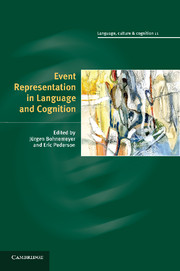Book contents
- Frontmatter
- Contents
- Figures
- Contributors
- Acknowledgments
- 1 On representing events – an introduction
- 2 Event representation in serial verb constructions
- 3 The macro-event property
- 4 Event representation, time event relations, and clause structure
- 5 Event representations in signed languages
- 6 Linguistic and non-linguistic categorization of complex motion events
- 7 Putting things in places
- 8 Language-specific encoding of placement events in gestures
- 9 Visual encoding of coherent and non-coherent scenes
- 10 Talking about events
- 11 Absent causes, present effects
- References
- Index
11 - Absent causes, present effects
How omissions cause events
Published online by Cambridge University Press: 01 March 2011
- Frontmatter
- Contents
- Figures
- Contributors
- Acknowledgments
- 1 On representing events – an introduction
- 2 Event representation in serial verb constructions
- 3 The macro-event property
- 4 Event representation, time event relations, and clause structure
- 5 Event representations in signed languages
- 6 Linguistic and non-linguistic categorization of complex motion events
- 7 Putting things in places
- 8 Language-specific encoding of placement events in gestures
- 9 Visual encoding of coherent and non-coherent scenes
- 10 Talking about events
- 11 Absent causes, present effects
- References
- Index
Summary
Introduction
Causal relationships range from the physical to the abstract: from friction causing heat to stress causing forgetfulness. This broad spectrum of relationships motivates the question of what all causal relationships have in common. One approach has been to specify the conditions for causation in terms of the occurrence or non-occurrence of events or states, with no regard to processes that produce these events or states. Because these theories specify causation in terms of the effects of causation, they will be referred to as outcome theories. Outcome theories typically describe the conditions for causation in terms of probabilities, counterfactuals, first-order logic or mental models. An alternative approach specifies the conditions for causation in terms of the processes that bring about outcomes; such accounts will be referred to as process theories. Process theories typically specify the conditions for causation in terms of the transmission of energy and force or their analogs in the social and psychological domains, for example, intentions and social pressure.
The two kinds of theories sometimes address different questions about causation, making them, in some sense, complementary. However, they contrast sharply on the question of what counts as a causal event, in particular, the phenomenon of causation by omission. Causation by omission occurs when the absence of an influence brings about an effect. We say, for example, Not watering the plant caused it to wilt or Lack of clean air causes dizziness.
Information
- Type
- Chapter
- Information
- Event Representation in Language and Cognition , pp. 228 - 252Publisher: Cambridge University PressPrint publication year: 2010
